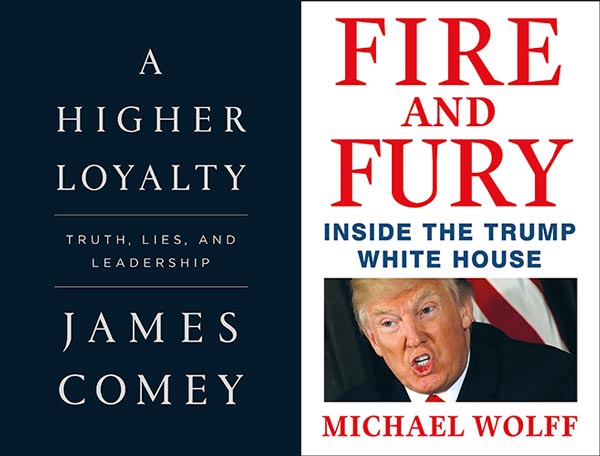Political Nonfiction’s Crucial Role for Future Historians

Jocelyn Pontes ’18 / Emertainment Monthly Contributing Writer
These days it seems that everyone is publishing their own book about politics in the Trump era. Since Donald Trump won the electoral college in 2016, we’ve witnessed the release of What Happened by Hillary Clinton, Fire and Fury by Michael Wolff, A Higher Loyalty by James Comey, and Fear by Bob Woodward, among a slew of other political bestsellers that have gripped the attention of this anxious nation. Many historians, journalists, and public figures have begun publishing their own politically relevant memoirs, including former First Lady Michelle Obama. Her memoir Becoming, to be released on November 13th, will detail her life both before and during her time in the White House. Though the book will be about much more than merely politics, the material concerning the last of the Obama years and the 2016 election will be of particular interest to American readers craving some explanation as to how we ended up here.

All of these authors are producing political nonfiction books at a growing pace with a distinct goal in mind: to preserve this unique historical moment. When future generations look back at the Trump era and ask, “how on earth did this happen?”, they’ll have a sizeable collection of resources in the form of these books, authored by those who were alive at the time of the events. Nonfiction as a whole has grown steadily in popularity in recent years (Publisher’s Weekly reports that adult nonfiction sales rose 3% from 2016 to 2017), and Trump’s rise to power and his continuous assault on truth has boosted political nonfiction sales in particular.
Since the election, Trump has proven himself to be averse to factual information, and he has no inhibition from compulsively dreaming up the most flagrant lies in attempts to improve his self-image (one of the most infamous lies being the size of the crowd at his inauguration). Rewriting the truth and replacing it with his own alternative version is a frightening habit which strikes a sense of responsibility in the minds of today’s nonfiction authors. They feel the need to record what has actually happened, in the event of further erasure of truth by this administration. Truth has become an increasingly rare commodity, one that nonfiction authors have recognized as highly sought-after by concerned readers.

The question of whether all of these authors are making worthwhile contributions to the historical record of this era, or whether they are simply delivering sensationalized entertainment to monetize the current trend, is up for debate, as it often depends on the particular book. For instance, the 2018 book Russian Roulette, by David Corn and Michael Isikoff, is a valuable work of detailed investigative journalism that delves into how Russia interfered in the 2016 presidential election and the ways in which Trump’s team was involved. As such, this book is a necessary read for understanding the Trump era and its origins.
In contrast to Corn’s and Isikoff’s careful research, Wolff’s Fire and Fury relies instead on interviews with White House staff to portray the inner-drama of the administration. It is disputed just how much of Wolff’s specific information is accurate, and the book is more akin to reality television meant to shock its readers, rather than intellectual material meant to educate them.

Despite the book’s use of sensationalism, it can be argued that Fire and Fury proves its value as an intriguing snapshot of this time period for future historians. Because of its explosive content and the huge national response it received, its publication has become a historical event in itself, one that will be interesting to look back on years from now.
The true value of these and other current political books will likely only begin to emerge years and decades from now, when America has gained enough temporal distance from this historic era in which it is now submerged. It will take a long time to fully understand exactly what this country has witnessed since the 2016 election, and the role of political nonfiction will be indispensable in that process.